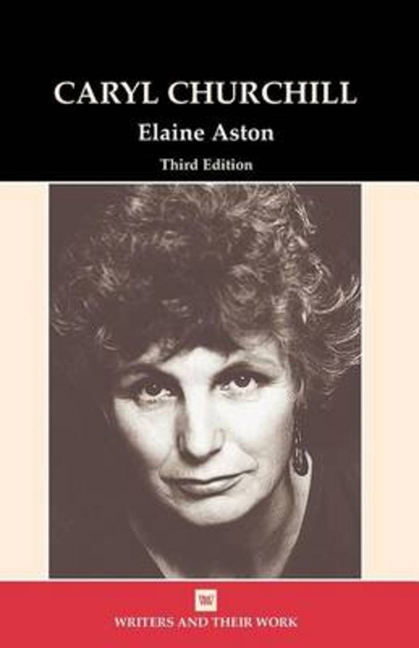Book contents
- Frontmatter
- Dedication
- Contents
- Acknowledgements
- Biographical Outline
- Abbreviations
- Preface
- Prologue
- 1 Beginnings: Radio, Stage and Television
- 2 The ‘Woman Writer’
- 3 The Dramatist as Socialist Critic
- 4 Communities in Dramatic Dialogue
- 5 Exploding Words and Worlds
- 6 1997 - Far Away
- 7 A Royal Court Celebration
- Notes
- Select Bibliography
- Index
4 - Communities in Dramatic Dialogue
- Frontmatter
- Dedication
- Contents
- Acknowledgements
- Biographical Outline
- Abbreviations
- Preface
- Prologue
- 1 Beginnings: Radio, Stage and Television
- 2 The ‘Woman Writer’
- 3 The Dramatist as Socialist Critic
- 4 Communities in Dramatic Dialogue
- 5 Exploding Words and Worlds
- 6 1997 - Far Away
- 7 A Royal Court Celebration
- Notes
- Select Bibliography
- Index
Summary
Research has always been important to Caryl Churchill's theatremaking. In prefaces, introductions, afterwords and interviews where she discusses her work, Churchill cites sources and publications which have helped to shape her drama, and, in this way, she permits the reader access to the thinking and making process of her work and ideas. Additionally, she also acknowledges her debt to group work, with companies such as Monstrous Regiment and Joint Stock, as detailed in the previous two chapters, and to directors, designers, and so on, who have collaborated with her in the theatrical process.
Research and the sharing of ideas underpin the three plays studied in this chapter in a special kind of way: they are all projects which involved Churchill, and the company she was working with, in oral research with particular communities. The first of these, Fen (1983), was researched by Joint Stock out in a remote East Anglian fen village. Serious Money (1987) took Churchill and actors from the Royal Court into London's world of high finance, and Mad Forest (1990) involved her and students from the Central School of Speech and Drama in a field-trip to Romania to grapple with political upheaval in Eastern Europe. All three projects relied on meeting with and engaging in dialogue with people involved in each community, whether in East Anglia, London, or Bucharest.
'LAND-GIRLS': FEN
In 1983, the year of Fen's production, Mary Chamberlain published a revised edition of her collection of interviews, Fenwomen, which documents the experiences of girlhood, schooling, marriage, work, religion, politics, recreation and ageing of women in a Fen village. Churchill acknowledges her debt to this study (from which she took quotations for the ‘Girls’ Song’ in Scene Seven), but, like Chamberlain, she and Joint Stock, also conducted their own oral research. Through talking to people, the actors learned about the lives, the work, and the history of the Fen community. As Chamberlain explains, researching orally in this way, the representation of ‘people's words and memories’ are ‘not the silent labours of a solitary archivist, but the result of a dialogue’. Moreover, she argues that researching oral history ‘offers the possibility of creating a democratic history in that it offers the means of expression for the past of the “common people”and offers a participation in that process’.
- Type
- Chapter
- Information
- Caryl Churchill , pp. 64 - 79Publisher: Liverpool University PressPrint publication year: 2010

